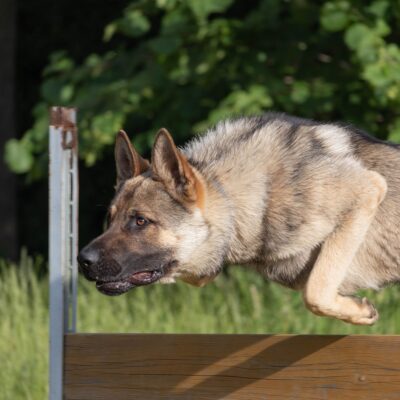
Do dogs get dizzy? Yes, they can. However, it isn’t thought they become dizzy from spinning around or chasing their tail. The dizziness is usually a result of a medical issue. In this article, we will discuss the nine most likely medical problems which could cause dizziness.
What Should I Do If My Dog Is Dizzy?
- Contact the veterinarian and make a note of any other symptoms or behavioral changes. Think about the past 48 hours and if anything different has happened or been consumed.
- Be careful and act cautiously, a confused and dizzy dog may act out of character. They could be scared, and it could result in aggression.
- If possible, encourage your dog to lay down or move to a safe area as dizziness can often result in them falling or losing control of their movements.
- Comfort them until the veterinarian can diagnose and treat the problem.
Busy? Get Your Hands Paws On The Answers Quickly…
- 1. Vestibular Syndrome or Vertigo
- 2. Stroke
- 3. Ear Infection
- 4. Encephalitis
- 5. Alcohol Toxicity
- 6. Concussion
- 7. Brain Tumor
- 8. Eclampsia
- 9. Motion Sickness
- FAQs
1. Vestibular Syndrome or Vertigo
What is it?
Often confused with a stroke, vestibular syndrome refers to a variety of conditions that affect the vestibular system, which is located in the inner ear. This system is responsible for balance, coordination, posture, and orientation. When something inhibits the communication between the inner ear and brain, it can cause dizziness and confusion.
Causes:
It can be caused by infection, trauma, tumor, and hypothyroidism. Older dogs are more commonly affected, giving it the common name of ‘old-dog vestibular syndrome’ or ‘canine idiopathic vestibular syndrome.’
Other symptoms:
- Falling
- Nauseous or vomiting
- Unnatural head tilt
- Unusual eye movements
- Circling or spinning
Treatment:
Your vet will need to conduct a CT or MRI on the brain and ears to determine the root of the problem and its treatment path.
Other tests, such as blood work or urine samples, may be taken to determine whether they have an infection or virus.
Vestibular disease can be peripheral (effecting the ear) or central (affecting the brain).
Treatment will vary depending on the cause. Antibiotics, radiotherapy, and other types of medication can be given.
2. Stroke
What is it?
A stroke occurs when the brain is starved of oxygen. It can often happen unexpectedly. There are two types of stroke, ischemic or hemorrhagic, and both cause brain cells to die due to the deprivation of blood and oxygen to the brain.
The effects of the stroke will vary depending on the length of time the brain goes without oxygen and blood. Different parts of the brain can be affected, depending on which part is affected will vary the impact it causes. Strokes can be fatal and life-altering. When caught early and with treatment and rehabilitation, dogs can make a recovery.
Causes:
Older dogs and those with health conditions are at a higher risk of suffering from a stroke. Although, according to the AKC, 50% of strokes have no known cause.
Other symptoms:
- Loss of balance
- Loss of coordination
- Unusual eye movements
- Strange facial expressions
- Unnatural head tilt
- Circling or spinning
- Loss of bladder and bowel control
Treatment:
There is no specific treatment for strokes.
The outcome will vary depending on how severe the stroke was and how quickly they receive medical treatment.
Take your dog straight to the veterinarian if you suspect they have had a stroke.
Try to keep your dog calm and comfortable as strokes can cause your dog to lose their balance and fall.
A full medical assessment will usually be done, including a blood test, x-ray, MRI, and cardiac checks to confirm your dog has had a stroke, and it is not another medical condition.
Medication may be given to prevent a future clot or any underlying issue found.
Your dog may need support after the stroke. Depending on the severity, they may need help with drinking, eating, and toileting.
Most dogs show signs of improvement after 72 hours – 6 weeks.
3. Ear Infection
What is it?
An ear infection occurs due to the growth of bacteria or yeast in the canal. Due to the shape of their ears, dogs are more prone to ear infections then humans. Dogs with long ears, like basset hounds, are at a higher risk of infection.
Most infections begin in the outer ear and, if not treated, can spread further into the middle or inner ear.
Causes:
Build up of wax, skin infection, allergies, or ear mites can cause an infection.
Prevention is always better than cure; keeping your dogs’ ear clean is vital.
Water or moisture is also a common cause of infection, so if your dog has been swimming or in the rain, make sure to dry the ears thoroughly.
Other symptoms:
- Head shaking
- Bad smell from the ear
- Scratching
- Redness of the inner ear
- Swelling of the outer ear
- Ear discharge
Treatment:
They are relatively easy to treat.
Usually, the veterinarian will thoroughly clean your dog’s ear. They will then give you an ear cleaner and instructions for use.
Medication and drops may also be supplied depending on the severity.
Chronic ear infections may require surgery to remove the canal.
4. Encephalitis
What is it?
Canine encephalitis is inflammation of the brain. It can occur for a variety of reasons. Any form can be life-threatening, but it often has a positive outcome when caught and treated early.
Causes:
Encephalitis can be caused by bacterial, viral, or fungal infection. Encephalitis can be tick-bourne and can be spread through tick bites. It can also be immune system-related; this is the most common cause. This is when the immune system malfunctions and creates an abnormal inflammation on the brain.
Other symptoms:
- Fever
- Seizures
- Loss of balance
- Loss of coordination
- Spine or neck pain
- Circling or spinning
Treatment:
A biopsy can be done to determine whether your dog has encephalitis. Once it has been diagnosed, further tests may be done to determine the cause.
Depending on the cause will depend on the treatment. Anti-viral, anti-bacterial, anti-fungal, or immunosuppressant drugs can be given.
5. Alcohol Toxicity
What is it?
When dogs consume anything alcoholic, it can result in alcohol toxicity or poisoning. Due to their size and weight, dogs are more susceptible to alcohol toxicity than humans.
Causes:
Consumption of anything alcoholic. This can include the obvious alcoholic beverages and anything containing alcohol such as desserts, and unbaked yeast dough.
Other symptoms:
- Incoordination
- Lethargy
- Vomiting
- Drooling
- Decreased respiratory rate
- Low blood sugar
- Low blood pressure
- Low body temperature
- Seizures
Treatment:
Depending on the cause of toxicity will depend on the treatment. If your dog has consumed food with alcohol, then your veterinarian may induce vomiting. Your dog may also need IV fluids, assistance with breathing, and help if they are suffering from seizures. With treatment, your dog should recover with 12-24 hours.
6. Concussion
What is it?
A concussion is an injury to the brain which affects their function. It can lead to unconsciousness. The effects of a concussion are usually temporary and only require rest.
Causes:
A concussion is the most common form of head trauma. This can occur for various reasons, including falling, being dropped, car accidents, animal attacks, rough play, abuse, or any other bang to the head.
Other symptoms:
- Bloody wound
- Lethargy
- Confusion
- Loss of balance
- Loss of coordination
- Lack of concentration
- Eye flicking or irregular eye movements
Treatment:
Minor concussion will usually just need rest and monitoring. If your dog has a more severe concussion, they may require an MRI scan, oxygen, fluids, or medication.
7. Brain Tumor
What is it?
A tumor or brain cancer is the growth of abnormal cells uncontrollably. Cancer can affect the brain or the covering of the brain.
Causes:
The cause of brain tumors is unknown. Some breeds appear to suffer more than others, including boxers and golden retrievers.
Other symptoms:
- Seizures
- Behavioral changes
- Loss of vision or strange eye movements
- Spine or neck pain
- Circling or spinning
- Weight changes
Treatment:
Sadly, few tumors can be cured. However, there are ways to manage and prolong or improve the quality of life. The treatment will vary on the type of tumor. Neurosurgery, radiation therapy, or chemotherapy may be used to reduce the size of the tumor. Steroids can also be given to slow the growth of the cancer.
8. Eclampsia
What is it?
Eclampsia affects lactating bitches. It is the result of a dangerous drop in calcium. It affects nursing mothers when their puppies are between 1 and 4 weeks in age, as this is when they are producing the most milk.
Causes:
The cause of eclampsia isn’t always known. However, the following are thought to increase the risk of drops in calcium:
- Toy breeds
- Those who are given calcium tablets during pregnancy as they are unable to regulate their calcium levels
- Dogs with larger litters as there is a higher demand for milk
- Poor nutrition during pregnancy
Other symptoms:
- Restlessness
- Excessive panting, heavy, or rapid breathing
- Vomiting
- Diarrhea
- Loss of coordination
- Sensitivity to sound, light, and touch
- Hyperthermia
- Weakness
- Change in behavior
- Tremors, spasms or stiffness
- Seizures
- Coma
Treatment:
Emergency veterinarian treatment is required, and recovery chances are good if caught and treated quickly. Usually, calcium will be given via IV, and if seizures are occurring, medication can be given to relax and prevent them.
9. Motion Sickness
What is it?
Motion sickness occurs when a dog is traveling, most commonly by car. It is more common in puppies, and most dogs outgrow car sickness by the time they’re 12 months. This is because their inner ear is not fully formed as a puppy; the inner ear is responsible for balance and coordination.
In dogs older than 12 months, it can often be confused with anxiety or stress. Anxiety and stress usually present in similar ways. Many dogs have car anxiety associated with negative experiences (e.g., veterinarian, kennels). This doesn’t cause dizziness, but can cause vomiting, lip licking, diarrhea, and drooling.
Distinguishing between the two is vital for treating it.
Causes:
Traveling, usually by car.
Other symptoms:
- Nauseous
- Drooling
- Vomiting
- Pacing
- Lip licking
- Diahrrea
Treatment:
Over the counter drugs are available. Alternatively, natural remedies, including ginger, is also thought to help with motion sickness.
FAQS

Do dogs get dizzy spells?
Yes, they can have dizzy spells for a variety of medical reasons. The most likely is due to vestibular syndrome.
Do dogs get dizzy from chasing their tails?
No, it isn’t thought to make a dog dizzy.
Do dogs get dizzy in cars?
If they suffer from motion sickness, then it is possible for dogs to feel dizzy in cars.
What can I give my dog for dizziness?
It depends on the cause of the dizziness. Contact a veterinarian if your dog is acting differently, as it could be the sign of a severe medical condition.
What are the signs of a stroke in a dog?
Common signs are loss of balance and coordination, abnormal eye movements, strange facial expressions, unnatural head tilt, spinning or circling, collapse, loss of bowel or bladder control, among others.
Why do dogs spin around on their bottoms?
If your dog is scooting around on their bottom, the likelihood is they are trying to itch it, or something is irritating it. The cause of irritation could be worms, infection, anal gland problems, diarrhea, or constipation.
Looking for more pawsome posts? Check these out…
Can Dogs Eat Lettuce?
How To Make A Snuffle Mat
When Do Puppies Lose Their Teeth?
Can Dogs Eat Broccoli?
Can Dogs Eat Watermelon?
Disclaimer: Each dog is different, and every circumstance is different. All efforts have been made to provide accurate information. However, it is not provided by a qualified Veterinarian, Veterinarian Surgeon, or Behaviorist. The information provided is purely educational. The information should not be used as an alternative or substitute for medical care. If you have any health or medical concerns, contact a qualified Veterinary Surgeon or Veterinarian immediately.










No Comment! Be the first one.